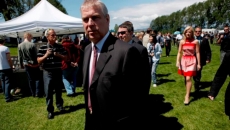OTTAWA - Conservative leadership candidate Jean Charest said Thursday he wouldn't touch Canada's existing gun laws — including when it comes to a ban on "assault-style" firearms.
In a wide-ranging interview, he said that when it comes to gun control he believes the focus should be on stopping the flow of handguns coming into Canada from across the border. He pointed to the volume of shootings that have happened in Montreal and Toronto.
That's where Ottawa should be spending its time and resources, he said, as opposed to regulating hunters and farmers.
"I don't own a firearm, but I've enjoyed hunting. And I think that there should be just a common-sense approach brought to this."
Asked specifically about the Liberal government's ban on some 1,500 models of "assault-style" firearms, he said, "I'm not seeking to change the laws as they are."
"That's not on my program."
Charest's position appears to run contrary to the party's, whose critics on the issue recently called for the ban to be scrapped and whatever money dedicated to it to be redirected to police and border services.
The Conservative leadership race has revived the question of what firearms owners want from Ottawa, as they make up a sizable part of its grassroots, heavily concentrated in Western Canada.
Their related advocacy groups are also well-mobilized and are already lining up against Charest. Supporters of leadership rival Pierre Poilievre have also come out swinging against Charest's past positions on firearms.
Before the former Quebec premier officially entered the race, Poilievre team member Jenni Byrne slammed Charest on Twitter by calling him a Liberal for having opposed former Conservative prime minister Stephen Harper's decision to end the long-gun registry.
The Conservatives' interim leader, Candice Bergen, rose to prominence by promising to axe the registry with a private member's bill in 2009. She helped to dismantle it after Harper won his majority in 2011.
The current gun-control battle Tories are waging is over a prohibition on what Trudeau calls "assault-style" weapons. The prime minister introduced it in May 2020, weeks after Canada suffered its deadliest shooting spree in history when a gunman in Nova Scotia killed 22 people and wounded three others.
The Liberals first promised to outlaw firearms like the AR-15 and Ruger Mini-14 during the 2019 federal election campaign.
"There's still time to change course," said Conservative Calgary MP Bob Benzen.
"Bring in measures that target smuggled street guns instead of lawful firearms owners."
Recently, the federal Liberals extended a two-year amnesty period for those who own firearms covered by the ban until October 2023, as it works to bring in a mandatory buyback program.
"I'm still waiting for any sort of evidence that shows that spending billions to confiscate lawfully obtained property instead of … stopping the smuggling of illegal firearms will reduce firearms violence in Canada," tweeted Michelle Rempel Garner, also a Conservative MP from Calgary.
Last summer's federal election saw the Conservatives struggle when it came to the issue of firearms policy.
Former leader Erin O'Toole courted firearms owners and their advocates through his 2017 and 2020 leadership runs. But midway through the 2021 election campaign, he reversed course on a promise inked into the party's platform to repeal the Liberals' ban on "assault-style" weapons.
He tripped up after Trudeau challenged him about the pledge during a live event. After fielding several days of questions about his position, O'Toole eventually inserted a footnote into the platform to say instead of repealing the prohibition outright, he would subject it to a review.






